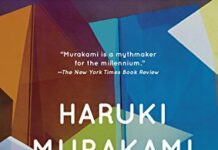
Ebook Info
- Published: 2011
- Number of pages: 258 pages
- Format: EPUB
- File Size: 0.38 MB
- Authors: Haruki Murakami
Description
Reality bends all the more acutely with lack of sleep in this stunning novel from the master of the surreal.Eyes mark the shape of the city The midnight hour approaches in an almost-empty diner. Mari sips her coffee and reads a book, but soon her solitude is disturbed: a girl has been beaten up at the Alphaville hotel, and needs Mari’s help. Meanwhile Mari’s beautiful sister Eri lies in a deep, heavy sleep that is ‘too perfect, too pure’ to be normal; it has lasted for two months. But tonight as the digital clock displays 00:00, a hint of life flickers across the television screen in her room, even though it’s plug has been pulled out. Strange nocturnal happenings, or a trick of the night?’A captivating mood piece, delicate and wistful’ Evening Standard
User’s Reviews
Reviews from Amazon users which were colected at the time this book was published on the website:
⭐[Note to readers unfamiliar with Tokyo: There are a couple facts about the city that one must understand for this book to make sense. First, while Tokyo is a city that’s always moving, the trains don’t run between roughly midnight and five am (your results may vary by station.) Second, because many people live far out in the suburbs and the cost of living is high, taxis aren’t an option for much of the population. These two facts add up to a slew of business for those industries that cater to the population caught out “after dark” (i.e. after the trains stop running–not after sundown) including: all-night diners, love hotels, c-stores, bars, pachinko parlors, bowling alleys, and manga bookstores.]This novel takes place in Tokyo during the wee hours of a single night. Murakami satisfies a form of voyeuristic impulse by giving us a peek into the lives of a few of the people out and about while the masses are home slumbering, or—at least–whiling away insomnia-ridden hours in the privacy of their own homes.The protagonist is a young college student named Mari. As she sits in a 24-hour Denny’s reading, Mari immediately triggers curiosity. She isn’t typical of the disheveled, boozy, or garish crowd out “after dark.” In a post-witching hour world of drunken salaryman, micro-miniskirted hostesses, tattooed yakuza gangsters, and nightlife-savvy travelers, the bookish young woman stands out. We soon learn that Mari didn’t miss the last train on accident, but rather is staying out all night on purpose to be out of the house. This further raises the level of intrigue.In the Denny’s, Mari is approached by a gregarious young man named Takahashi who is grabbing a quick snack before going back to his nighttime hobby of jamming in a jazz band. Takahashi introduces himself as someone who already knows Mari from a party. He’s a couple years older than the young woman, and was a classmate of Mari’s sister, Eri. The party at which he met Mari was mostly attended by kids the age of Eri and himself, and Mari was just along for the ride with her more popular sister.Eri is another major character in the book, although her mysterious presence is mostly in a sleeping state. Eri, unlike the plain Mari, is drop dead gorgeous, and has been doing modeling jobs since she was a child. Takahashi is but one of the young men infatuated with Eri—though we get the feeling that Takahashi realizes that Eri isn’t in his league. He’s a pragmatist—if begrudgingly so. The rest of the book hinges on this chance encounter between Mari and Takahashi.Suspicions that the grim hours of circadian disruption are the domain of crime and vice are confirmed when a bulky former female wrestler turned love hotel manager, named Kaoru, rushes into the Denny’s seeking Mari. Kaoru is an acquaintance of Takahashi (who has since left the diner to play jazz) and she is seeking Mari because Takahashi told her that Mari spoke fluent Chinese. A Chinese prostitute was beaten up at the love hotel, the Alphaville, and Kaoru needs to talk to the foreign woman to get to the bottom of the matter. Kaoru’s investigation is in part driven by the fact that the Chinese hooker’s John dashed on the hotel bill, but the former wrestler also has a soft spot for the beaten girl and wants to do the right thing by her—though Kaoru knows the police can’t be involved because the Chinese working girl will, at a minimum, be deported by the authorities, or, worse, be punished by the Chinese mafia who pimp her.As with a few of Murakami’s other books, this book might be labeled “slipstream.” Slipstream is a genre that blends mainstream literary fiction with supernatural elements / speculative fiction. However, the scenes that aren’t realist generally involve the sleeping Eri in her room by herself. So, it may be that Murakami is just conveying the hazy and illusory world of sleep and life at the edge of sleep. I’ll leave it to the reader to make their own interpretations of this. There are also coincidences that could strain credulity, but this may just be an attempt to convey that the world of Tokyo “after dark” is a small pond.I’d highly recommend this novel. Murakami gives us likable characters and one can see why said characters are draw to each other despite their very different existences. Then he puts them into situations that demand resolution. It’s a short, readable, and interesting novel.
⭐The quote that serves as the title of my review aptly demonstrates the deftness with which Murakami not only involves his audience in the scene, but also in telling the story. It’s simple, unobtrusive and powerful. Profound without being pretentious. The whimsy and post-modernism of Nabokov with the gripping relentlessness of Matheson. Thanks in no small part to Rand’s translation, the clarity, focus and purpose of the prose is unmissable. Informative but still emotionally resonant. In a word: outstanding.What begins as a tale of seemingly unrelated characters going about their seemingly unrelated lives quickly becomes something else; an intersection of choices and consequences from a divergent cross-section of city residents. While their paths become more and more connected, their individual lives seem to become less cohesive until each is left to ponder what’s truly important. A fantastic example of the difference between day-life and night-life. A wonderful allegory for late-night musings and the confusion that often accompanies said thoughts, as well as the inevitable outcome of those ruminations.I’m glad I finally got to read Murakami and am looking forward to more of his work in the future.”Wouldn’t it be too sad to walk into Denny’s and order chicken salad without looking at the menu? It’s like telling the world, ‘I come to Denny’s all the time because I love the chicken salad.’ So I always go through the motion of opening the menu and pretending I picked the chicken salad after considering other things.””The mask possesses equal levels of sorcery and functionality. It has been both handed down from ancient times with darkness and sent back from the future with light.””Near the head of the bed a digital clock soundlessly and steadily renews its display of the time. For now, the clock is the only thing in the room evidencing anything like movement: a cautious nocturnal creature that runs on electricity. Each green crystal numeral slips into the place of another, evading human eyes. The current time is 11:59 p.m.””I got this absolutely hopeless feeling. I don’t know how to put it: it was like the whole world’s electricity supply suffered a voltage drop. Everything got one step darker, one step colder.””He is considering the aspects of the interrelationship of thought and action. Is action merely the incidental product of thought, or is thought the consequential product of action?””What we see now is a gigantic metropolis waking up. Commuter trains of many colors move in all directions, transporting people from place to place. Each of those under transport is a human being with a different face and mind, and at the same time each is a nameless part of the collective entity. Each is simultaneously a self-contained whole and a mere part.”
⭐As I work my way through the works of Haruki Murakami, this 2004 short novel, running to around 200 pages, has (thus far, at least) provided the most ‘perfectly formed’ blend of surreal elements, affecting characterisations and resolved narrative. Charting one night (indicated by chapter headings with a time-advancing clock) in the intertwining lives of various big city dwellers, the author paints (at the tale’s centre) a beautifully fragile portrait of the budding friendship between two unassuming young protagonists, the 19-year old Mari, pining for a seemingly lost relationship with her older, more glamorous sister (Eri), and the carefree trombone-playing student, Takahashi, who spends his nights jamming with his musician friends. Around this central narrative, Murakami gives us a taste of the seedier side of urban nightlife, including an assault on a Chinese prostitute and a potential revenge attack by pimps/gangsters, repeatedly being taken in via a surreal bird’s eye view of proceedings. Along the way, many of the author’s characters give us their philosophical take on life and the circumstances that have led to them being marginalised characters in mainstream society and all of this is captured via the author’s deliciously easy-to-read, but highly evocative, prose.I noticed one of the critical blurbs of the book likened it to a literary equivalent of the Richard Linklater film Before Sunrise, as if it had been directed by David Lynch. More simply for me, After Dark (once again for this author) conjured up the films of the Hong Kong film-maker Wong Kar-Wai and, in particular as far as the central relationship was concerned, that film-maker’s urban masterpiece, Chungking Express.
⭐Yet another more than worthwhile read from Murakami that takes place over one night.The clever juxtaposition between both sisters worlds builds to an almost nightmarish quality by the end, with the unexplainable almost becoming a tangible plot – but not quite.The mystery inside the mystery is something Murakami does very well – and in this case it’s hard to give spoilers in a review because the whys and wherefores are not fully communicated. By the end After Dark feels like a long goodbye, but the person you are saying goodbye to is asleep…..seemingly forever. And just that alone, without the various criminal and cat feeding goings on in this vibrantly drifting night time tale, is enough to make you understand that the main character is, like all the authors main characters, caught between two worlds. She needs to stay for her sister, but wants to move on, and even if the sister is just existing, that is enough to make it really really tough.I really love the visions of night time Tokyo – the seediness is excellent. I do think the story is cleverly paced. I’m not entirely satisfied that we get to know so little about the sleeping sister. You want her mystery to be explored more.But the book stays with you like a slightly creepy but slightly tender night time stroll in late night Tokyo.
⭐I thought it was a usual Murakami, and people who liked his other books would probably like this.Set over the course of one eventful night, each chapter starts with the time as we progress through the night. There are few major events but lots of character building and reflecting on the human condition. This is very good and beautifully written but I feel not as strong as in some of Murakami’s other works. There’s a really good ongoing use of metaphor that gives the disparate events in the book a shared thread and commonality but I won’t spoil what it is!I had unfortunately read beforehand that the book finishes abruptly, however I did not find that all. In fact the book had a much lengthier conclusion than I would have expected from Murakami. Some of the final chapters being more like epilogues round the book off very nicely.Overall a good read that I’d recommend to someone that likes reflecting on the human condition through meandering interpersonal connections and somewhat surreal interactions. However I’d recommend some of Murakami’s other stories first. Desire Minis and Men Without Women are both much shorter but I think stronger entries to start with.
⭐I read this book for the Popsugar Reading Challenge 2016. I’m doing the challenge in category order. This is my book for the ‘a book translated into English’ category.After Dark is one of the best and most challenging books I’ve read in ages. I loved it. This is not my usual sort of book. At times it was like being trapped in some weird, disjoined and trippy dream; the kind of dreams where there are lots of shadows and things you can never quite see. I quite enjoyed being pulled along by Murakami’s amazing, vivid and descriptive writing. I’m not a fan of hard books and tend to get on better with books I can get through fairly quickly. This is the kind of book that reminds you of how good it feels to be completely absorbed in what an author has created between the pages (or between the back and front cover of my Kindle). I thought this was a wonderful, surprising book. I need to read more by this author.
⭐Murakami delivers his exceptional flavour of alienation in this original book. Although not quite as involved as some of his other books, i.e. “Kafka” or “Hardboiled”, there is no dilution of character or story. This is rather a snapshot of a single night between roughly midnight and dawn, written in an incredibly fluid real-time.The characters are believable and sympathetic, as well as being wonderfully enigmatic. The prose is stylish and inspiring, but perhaps not to everybody’s taste. The author’s voice is particularly strong in this one and if the first page puts you off, you may or may not get over it to enjoy the rest of this heartbreaking story.There’s the usual twist of the bizarre, but it is not as macabre as some of his other tails. The character is the focus, and although this is perhaps a postmodern experiment in “extended flash fiction” there is no loss of life (in the sense of characterisation – I wouldn’t spoil the plot!).The threads of the stories come together with great emotion. There is an underlying feeling of power to Murakami’s words in this one – it almost induces genuine panic or heartbreak or hope, despite being such a fast read.Very beautiful, however if you want more substance to story rather than character perhaps seek out “Kafka” or “South of the Border” if you haven’t already read them.7 / 10David BrookesAuthor of “Half Discovered Wings”
Keywords
Free Download After Dark in EPUB format
After Dark EPUB Free Download
Download After Dark 2011 EPUB Free
After Dark 2011 EPUB Free Download
Download After Dark EPUB
Free Download Ebook After Dark





